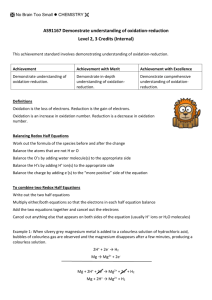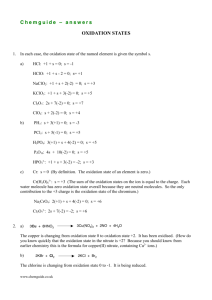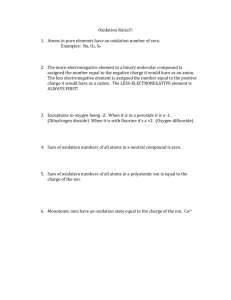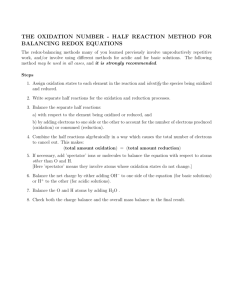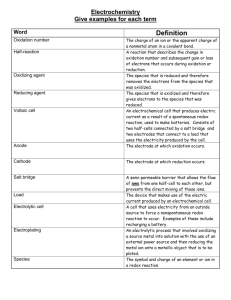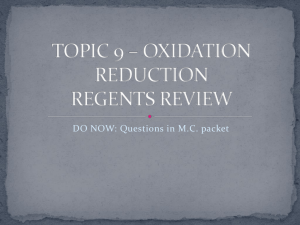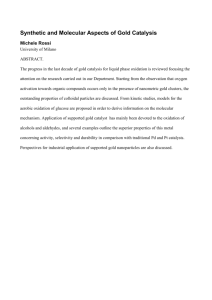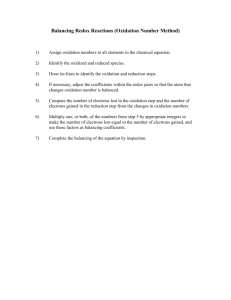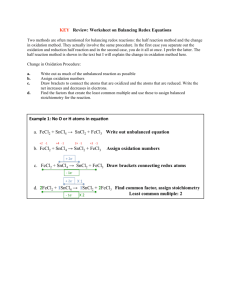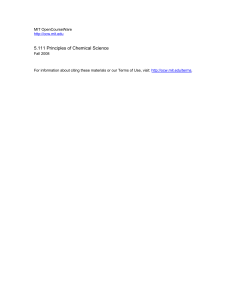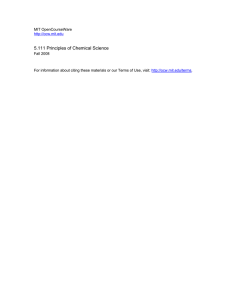Presentation
advertisement
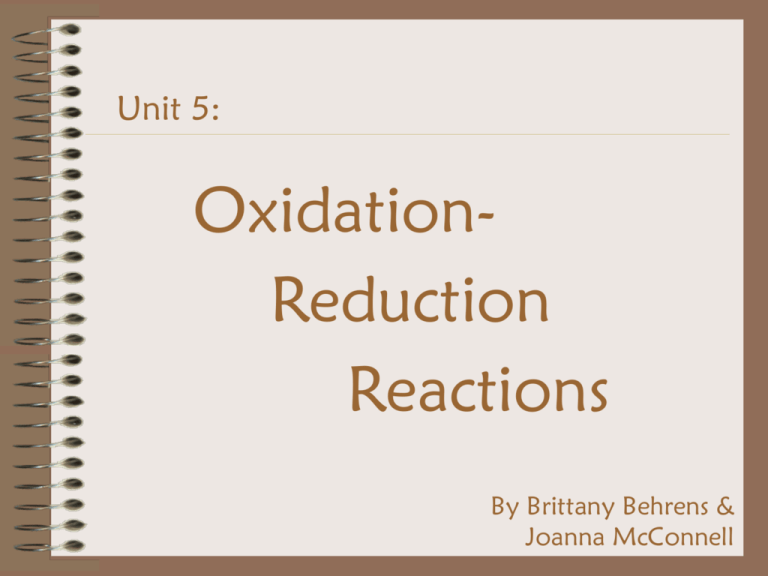
Unit 5: OxidationReduction Reactions By Brittany Behrens & Joanna McConnell What is Redox? An oxidation-reduction (redox) reaction is a chemical reaction in which electrons are transferred between reactants. LEO says GER: Loss of Electrons is Oxidation Gain of Electrons is Reduction Oxidation and reduction cause a change in the oxidation number of each element involved in the redox reaction. Rules for Redox: Oxidation Numbers 1. The oxidation number of an atom in an uncombined element is zero. 2. The oxidation number of a monatomic ion is its ionic charge. 3. The algebraic sum of the oxidation numbers of all of the atoms in a neutral compound is zero. 4. The algebraic sum of the oxidation numbers of all of the atoms in a polyatomic ion is the net ionic charge. 5. Fluorine = -1 Elements that form monatomic ions often have their charge = oxidation number Group 1 = +1 Group 2 = +2 Group 7 = -1 H is usually +1 O is usually –2 Peroxides are a notable exception: in H2O2, H=+1 and O=-1. Oxidation Number Example Consider this compound: K2Cr2O7 Step 1: Use oxidation number rules to assign numbers to as many elements as possible. Group 1 elements, including K, have oxidation number +1 Oxygen has oxidation number -2 The neutral compound’s sum of oxidation numbers = 0 Step 2: Solve for the oxidation number of Cr. 2(+1) + 2(x) + 7(-2) = 0 2x = 12 x=6 Thus, the oxidation number of K=+1, O=-2, and Cr=+6. Balancing Redox Equations Consider this redox reaction: Dichromate ions and Iron (II) ions react in acid. Step 1: Write a half-reaction for each of the reactants. Cr2O72- Cr3+ Fe2+ Fe3+ Balance for Mass Step 2: Since the reaction is being balanced in acid, add H+ and H2O as needed to make sure that the same number of each element is present on each side of each half-reaction. 14H+ + Cr2O72- 2 Cr3+ + 7H2O Fe2+ Fe3+ Balance for Charge Step 3: Since this is a redox reaction, add electrons (e-) as needed to make sure that the net charge of each half-reaction is ZERO. 6e- +14H+ + Cr2O72- 2Cr3+ + 7H2O Fe2+ Fe3+ + e- Add the Half-Reactions Step 4: Multiply the half-reactions by coefficients to cancel out the electrons. Add the two half-reactions to determine the equation for the net reaction. 6e- + 14H+ + Cr2O72- 2Cr3+ + 7H2O 6 Fe2+ 6Fe3++ 6 e14H+ + Cr2O72- + 6Fe2+ 2Cr3+ + 6Fe3+ + 7H2O Check your Work Word Equation: Dichromate ions and Iron (II) ions react in acid. Balanced Equation: 14H+ + Cr2O72- + 6Fe2+ 2Cr3+ + 6Fe3+ + 7H2O Is mass conserved? Hydrogen: Chromium: Oxygen: Iron: 14 atoms on the left, 7(2)=14 atoms on the right 2 atoms on the left, 2 atoms on the right 7 atoms on the left, 7 atoms on the right 6 atoms on the left, 6 atoms on the right Is charge conserved? 14(+1) + 1(-2) + 6(+2) = 2(+3) + 6(+3) + 7(0) 14-2+12 = 6+18 24 = 24 Basic Balancing Step 5: If the reaction is to be balanced in a basic solution, follow the steps for balancing in acid, then add OH- as needed. 14H+ + Cr2O72- + 6Fe2+ 2Cr3+ + 6Fe3+ + 7H2O +14OH- +14OH- 14H2O + Cr2O72- + 6Fe2+ 2Cr3+ + 6Fe3+ + 7H2O + 14OH7 7H2O + Cr2O72- + 6Fe2+ 2Cr3+ + 6Fe3+ + 14OH- Applications: Electrochemistry AnOx RedCat e- flow Voltmeter Anode Oxidation Loses Mass Cathode Reduction Gains Mass Salt Bridge (KNO3) Al Ag K+ NO3- Look up Eo values in a table of standard reduction potentials. Al3+ Al(s) Al3+(aq) + 3eAg+(aq) + e- Ag(s) Ag+ LEO GER If Eorxn is positive, the reaction is spontaneous Eo = +1.66 V Eo = +0.80 V Al(s) + 3Ag+(aq) 3Ag(s) + Al3+(aq) Eorxn = +2.46 V The Nernst Equation Standard Reduction Potential (V) Nonstandard Reduction Potential (V) o E=E Moles of etransferred RT – nF 8.31 J/Kmol Temperature (K) lnQ Reaction Quotient: [products] [reactants] 96,500 C/mol e- Remember… For Oxidation-Reduction Reactions, A redox reaction is a chemical reaction in which electrons are transferred between reactants. LEO says GER AnOx, RedCat The Nernst Equation (given on the AP exam) Remember to Study for the AP Exam ~End~ ~End~ ~End~ ~End~ ~End~ ~End~ ~End~ ~End~ ~End~ ~End~ ~End~ ~End~ ~End~ ~End~
